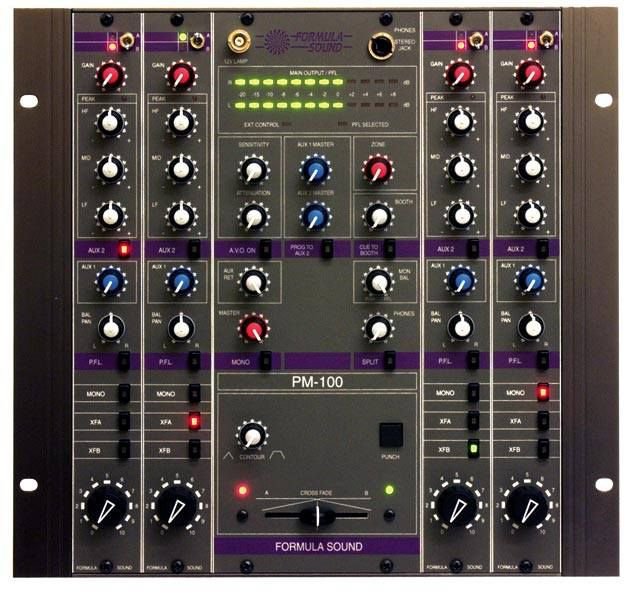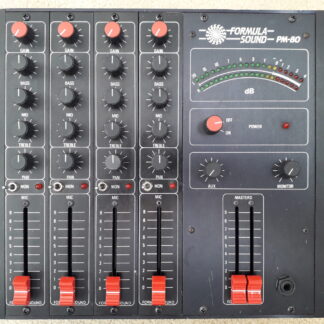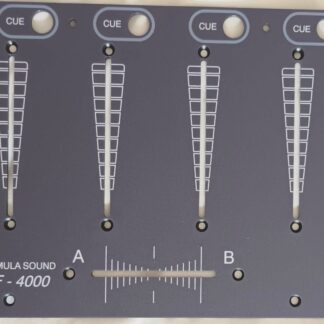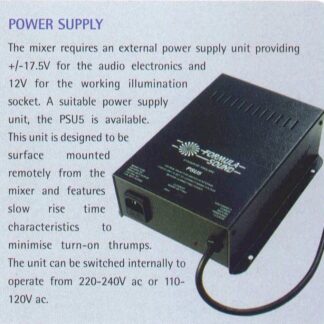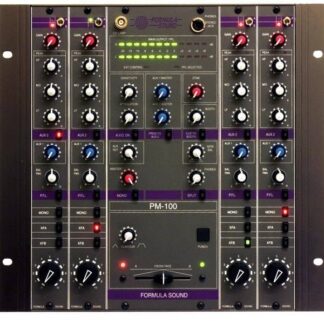Description
High value item, payment via bank transfer only / please allow 2 weeks for us to process and pack this item.
PM100 4 Channel mixer 13 Inch Rack Mount rotary mixer.
The Formula Sound PM-100 mixer is essentially the successor to our award winning PM-80 and
PM-100 mixers.
We believe that the experience we have gained over the past 21 years of producing the PM-80 and
PM-90 has produced a mixer that is equal to the challenges of the new millennium. We have incorporated new features and innovations that have been in our file of wish lists from operators around the world. We have tried to provide a tool that can be individual to the operator, We can provide advice on how to achieve the best performance out of this equipment but when it comes to mixing it becomes personal taste so we have provided the tools to do the job with choices where possible. We believe that the equipment should not restrict the creative talent but help it.
General Description
The PM-100 is a compact modular production mixing system which combines exemplary technical
performance with the highest standards of mechanical engineering.
The system is totally modular each module being complete in itself. The connections to the modules are via a flexible 34 way ribbon cable and gold plated computer grade connectors.
The chassis contains no electronics therefore upgrading to a larger chassis size is quite straight forward.
There are only three types of module, a universal input channel module, a blank module to fill unused space in the chassis and the output module containing all the mixing, monitoring, and output electronics.
The mixer is factory assembled with the output module towards the right hand end of the chassis and the input modules to the left. But in fact modules may be positioned in any format required.
Specific layouts may be ordered or engineers can easily change layouts to suit individual requirements. Blank modules where fitted may be easily replaced by input modules at a later date if required.
The chassis is available in 3 standard sizes, 4 channel, 8 channel (19″ rack mount) and 12 channel.
Larger sizes can be offered to special order.
Power Supply
The mixer requires an external power supply unit providing +/-17.5V for the audio electronics and 12V for the working illumination socket.
A suitable power supply unit, the PSU5, is available. This unit is designed to be surface mounted remotely from the mixer and features slow rise time characteristics to minimise turn on thrumps.
The unit is internally switchable to operate from 220-240V AC or 110-120V AC. Check that the voltage selector switch is correctly set for the mains voltage available before connecting power.
Input module:
PM – 100 UNIVERSAL INPUT MODULE
Input Sources. The design of this module allows almost any input source to be used and further allows the operator to switch between any two input sources.
This is achieved by providing a balanced low impedance low noise microphone pre amplifier; a stereo RIAA equalised pre amplifier which also may be configured as a normal flat response line level input; and a normal line level input stage.
Input Connectors Rear panel mounted 1 – XLR Mic input socket, 1 – 3
pole jack insert socket (provides connection for external equipment into
the microphone channel).
Two pairs of gold plated RCA phono sockets are provided for the stereo
inputs.
Input A may be the RIAA input or a normal line input as selected by 2
internal jumpers. The B input may be a microphone input or a stereo line
input as selected by a further internal jumper. Rear panel gain trims are
provided to set the maximum gain available on any input.
INPUT SELECTION A front panel mounted toggle switch allows rapid
selection of the A or B input. Red and Green led’s provide clear visual
indication of the input selected.
Adjacent areas are provided to label the input sources.
GAIN A control allows the operator to compensate for variations in pro-
gramme material. (See later section on gain)
PEAK A red led indicates when the peak signal level in the module is just
below clipping.
Three band equalisation
HF (High Frequency or Treble)
This control provides +6dB boost -20dB cut @ 10kHz with a shelving
response.
MID (Middle Frequencies)
This control provides +6dB boost -20dB cut @ 1kHz with a bell response.
LF (Low Frequency or Bass)
This control provides +6dB boost -20dB cut @ 100Hz with a bell response.
This response has been chosen so that sub sonic frequencies are not boosted
by this control.
All E.Q. controls have a centre detent at the (E.Q flat) centre position.
The E.Q. function may be disabled by the setting of internal jumpers (see
diagram).
AUX 2 Push button with led illumination.
When depressed the signal in this module is mixed with any other source
selected. The resulting mix is available at the Aux 2 outputs on the master
module. Internal jumpers allow the source to be selected pre of post (before
or after) the channel fader. (See output section for more options on Aux2)
AUX 1 has a similar function to Aux2. A control replaces the switch so a
separate level mix of channels is available at the Aux1 outputs on the master
module. Internal jumpers are also provided for pre post selection.Bal – Pan (Stereo balance & Pan)
With a stereo source selected this control provides adjustment to balance
stereo signals.
With a microphone source selected or the mono switch depressed this control
allows the source to be positioned anywhere in the stereo image.
A centre detent is provided at the control centre position.
PFL (Pre Fade Listen)
Push button with red led illumination.
When depressed the signal in this module is connected to the PFL Mix Buss.
Any number of channels may be selected simultaneously, the sum of which
will be available in the master module for monitoring. An indicator led below
the Vu meters also illuminates if any PFL switch is depressed. (See
monitoring section on output module for more information)
MONO Push button with red led illumination.
When depressed this switch simply links left and right signals and allows
stereo signals to operate in mono.
XFA (Crossfade A select) Push button with red led illumination.
Depressing the switch routes the channel signal via the VCA controlled
crossfader channel A. XFA will take priority if both buttons are depressed.
XFB (Crossfade B select) Push button with green led illumination.
Depressing the switch routes the channel signal via the VCA controlled
crossfader channel B.
Red and green led switch illumination along with similar illumination on the
crossfader gives good visual indication of routing status.
If neither of the crossfade assign switches are depressed and a stereo source
is selected the signal will be routed via the stereo buss to the output section
bypassing the crossfade circuitry.
If a microphone source is selected the crossfade A&B assign switches will not
function and will not illuminate if depressed. The signal will be routed to the output section via the microphone mix buss.
Fader
A 60mm studio quality linear fader is provided. This should be used to fade up and down the volume of the channel. For normal production operation the fader should be set at the top (No.9) and the gain control adjusted for normal volume. The fader should be used to fade in the signal at the required time taking the fader to the top. This lets you concentrate on the timing confident that the volume will be correct. If you want to operate with some gain in hand (e.g. mic mixing) operate with the fader set at No.7.
Always operate with the gain set as low as possible to achieve the desired results. (See the section on gain)
MUTE
Push button with red led illumination.
When depressed signal feeds to the programme busses are muted.
AUX1 and AUX2 are not affected. An internal jumper allows this switch to be disabled.
Factory option – the mute switch may be rewired to provide a low voltage remote start switch wired to a 3.5mm jack socket on the rear panel.
Includes psu5 power supply.

